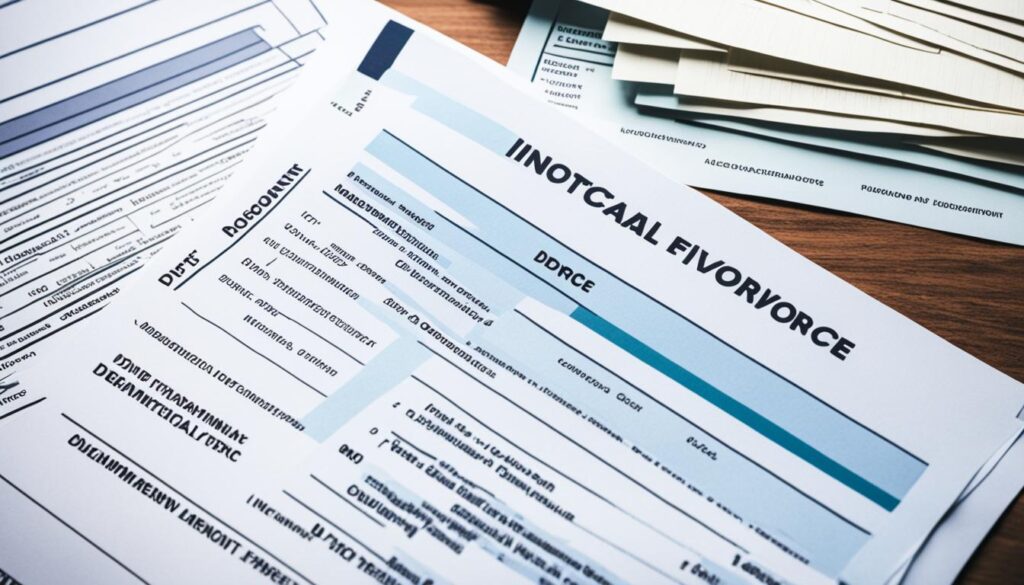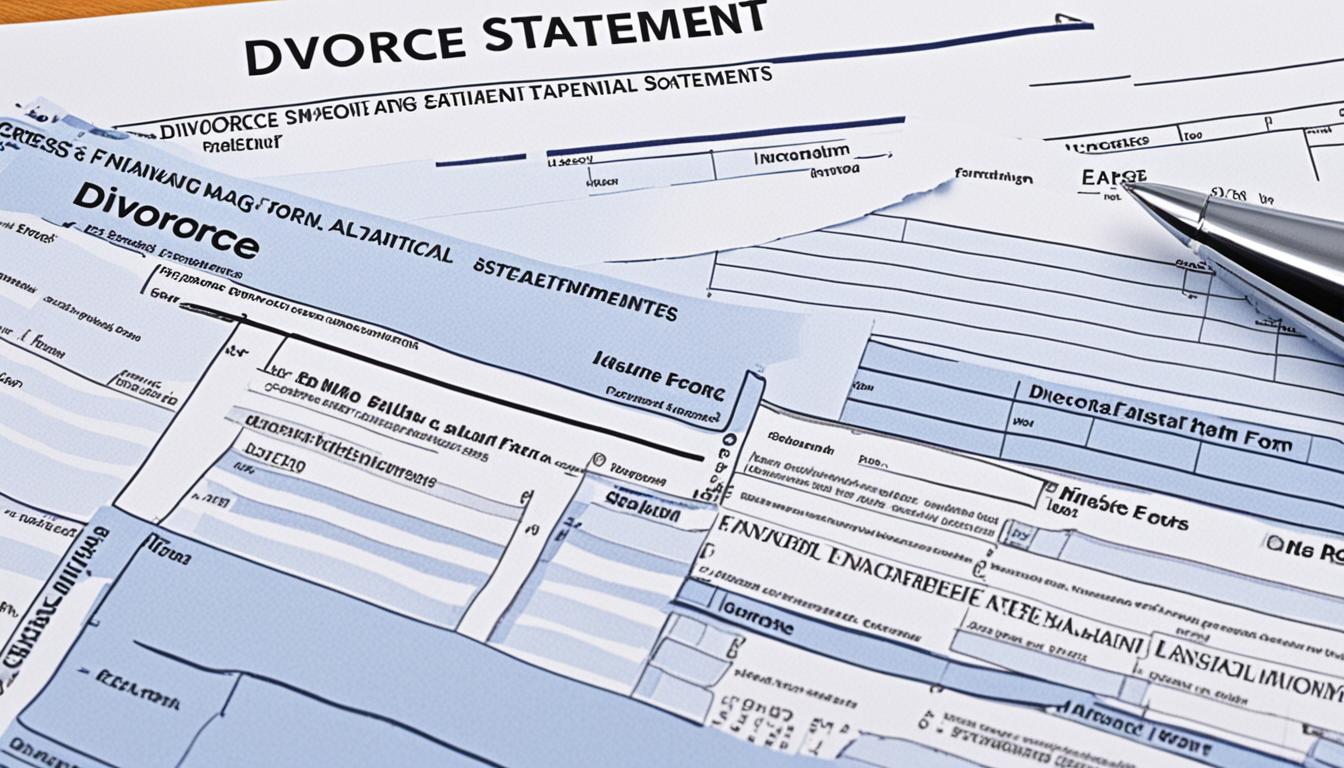Did you know that accurately filling out a financial statement is crucial for reaching a fair and just agreement in a divorce? Mistakes or inaccuracies could result in serious consequences, including fines and damage to your reputation.
After filing for divorce, one of the important tasks is filling out a financial statement. This document provides the court with an overview of your income, expenses, and assets. It is crucial to be honest and thorough while filling out the financial statement, as any omissions or misrepresentations can have serious consequences, including penalties and damage to your credibility. The form may vary depending on your location, but the purpose remains the same – to give the court an accurate snapshot of your financial situation. It is essential to gather supporting documentation, such as tax returns, pay stubs, financial statements, and bills, to verify the information you provide.
Key Takeaways:
- Accurately filling out a financial statement is crucial for a fair and equitable divorce settlement.
- Mistakes or misrepresentations in the financial statement can lead to penalties and damage to your credibility.
- Gather supporting documentation to verify the information provided in the financial statement.
- Be honest and thorough while filling out the financial statement to provide an accurate snapshot of your financial situation.
- The financial statement helps the court make decisions regarding support, property division, and attorney fees.
Why is the Financial Statement Important in Divorce?
The financial statement plays a crucial role in the divorce process as it is used by the court to make decisions regarding spousal support, child support, attorney fees, and property division. It provides a comprehensive overview of your financial situation and helps the judge assess your ability to pay or receive support.
Considered a sworn statement under penalty of perjury, any deliberate misrepresentations can lead to penalties or even legal consequences. Accurate and detailed information in the financial statement is vital for a fair and equitable divorce settlement.
By providing a clear picture of your income, expenses, and assets, the financial statement assists the court in determining appropriate support payments, dividing marital property, and ensuring that the financial needs of both parties and any children involved are met.
The financial statement is like a financial snapshot of your life during the divorce process. It is an essential document that provides transparency and allows the court to make informed decisions based on your financial situation.” – Family Law Attorney, Jane Wilson
With the financial statement serving as a key factor in divorce proceedings, it is crucial to be diligent and accurate while filling it out. Providing misleading or incomplete information can lead to unfair outcomes and damage your credibility in the eyes of the court.
Next, we will explore the specific documentation required for the financial statement to ensure a comprehensive and accurate representation of your financial situation.
Key Points
| Financial Statement in Divorce | Importance |
|---|---|
| Used by the court to make decisions | To assess ability to pay/receive support |
| Sworn statement under penalty of perjury | Deliberate misrepresentation can lead to penalties |
| Provides a comprehensive financial snapshot | Aids in fair and equitable settlement |
| Key factor in determining support payments and property division | Ensures financial needs are met |
Now that you understand the importance of the Financial Statement in Divorce, let’s delve into the specific documentation required to support your financial disclosures.

What Documentation is Required for the Financial Statement?
To accurately fill out a financial statement, you will need to gather various documents that support your income, expenses, and assets. Providing accurate and up-to-date documentation is crucial to back up the information you include in your financial statement.
Some common documents required for the financial statement include:
- Tax returns for the previous years: These help provide a comprehensive view of your income and deductions.
- Pay stubs: These documents show your regular income and any additional earnings.
- Financial statements from bank accounts, credit cards, and retirement accounts: These statements offer an overview of your assets and liabilities.
- Real estate information: Documenting property ownership and any mortgages or loans connected to it is essential.
- Loan details: If you have any outstanding loans, such as a car loan or student loan, gather relevant information about those debts.
- Bills: Collect bills for utilities, insurance, childcare, and other regular expenses to accurately represent your monthly financial obligations.
Gathering these documents ensures that you have the necessary evidence to support the figures you provide in your financial statement.

Having all the necessary documentation ready will help you accurately complete your financial statement and present an accurate representation of your financial situation to the court.
Tips for Filling Out the Financial Statement
Filling out the financial statement can be a complex task, but following some tips can make the process smoother.
- Calculate your income carefully: Include all sources of income and average variable income over a specific period. This ensures that you provide an accurate representation of your financial situation.
- Thoroughly document your expenses: Include all necessary categories and be detailed in recording your expenses. Additionally, utilize averages for expenses that are incurred irregularly to provide a comprehensive overview.
- Gather supporting documentation: It is crucial to gather all appropriate documentation to support the information you provide in your financial statement. This includes tax returns, pay stubs, financial statements, and bills. Having this documentation ready will help verify the accuracy of the information you provide.
- Avoid double-dipping: Ensure that you list your expenses only once. Double-dipping can lead to inaccuracies and misrepresentations, which may have consequences during the divorce proceedings.
- Designate separate property accurately: If you have separate property that is not subject to division, make sure to accurately designate it in your financial statement. Provide all necessary attachments or documentation to support the separate property claim.
If you have any questions or need assistance in completing the financial statement accurately, it is advisable to seek guidance from your attorney. They can provide you with the necessary expertise and ensure that you navigate the process effectively.

Image: Illustration of a person organizing financial documents for a financial statement.
Understanding the Categories in the Financial Statement
The financial statement is a comprehensive document that provides an overview of your financial situation during divorce proceedings. It is divided into various categories, each representing different aspects of your financial life. Understanding these categories and accurately filling them out is essential to present a complete picture to the court.
Here are the key categories typically included in a financial statement:
1. Personal Information
This section includes basic personal details such as your name, address, contact information, and social security number.
2. Gross Weekly Income from All Sources
Here, you need to list all sources of income including wages, self-employment income, rental income, dividends, and any other form of regular income.
3. Itemized Deductions from Gross Income
In this category, you should list all allowable deductions such as federal and state taxes, healthcare costs, retirement contributions, and any other deductions that reduce your gross income.
4. Adjusted Net Weekly Income
This section calculates your adjusted net weekly income by subtracting the itemized deductions from your gross weekly income. It represents your disposable income after deducting allowable expenses.
5. Other Deductions from Salary
If you have any additional deductions such as union dues, health insurance premiums, or other mandated payments, this is where you would list them.
6. Net Weekly Income
This category represents your net weekly income after deducting both itemized deductions from gross income and other deductions from salary.
7. Gross Yearly Income from the Prior Year
Here, you need to provide your total gross income from the previous year, including any bonuses, commissions, or other forms of income received during that period.
8. Weekly Expenses
This section requires you to list your weekly expenses, including housing costs, utilities, transportation expenses, healthcare costs, childcare expenses, and any other regular living expenses.
9. Assets
Include all your assets in this category, such as real estate, vehicles, investments, bank accounts, retirement accounts, and any other valuable possessions.
10. Liabilities
Here, you should list all your liabilities, including mortgages, loans, credit card debts, and any other outstanding debts or obligations you have.
By accurately providing the necessary information under each category, you can ensure that the court has a clear understanding of your financial situation, thereby facilitating fair and informed decisions during the divorce proceedings.

How to Calculate Income and Expenses in the Financial Statement
Calculating income in the financial statement involves accurately reporting your income from various sources. This includes base pay, self-employment income, social security, public assistance, rental income, and other sources. It may require averaging variable income over a specific period to provide a more accurate representation of your earnings. By carefully considering all sources of income, you can ensure that your financial statement reflects your true earning capacity.
On the other hand, calculating expenses in the financial statement requires a thorough assessment of various categories. These categories typically include housing, utilities, transportation, childcare, healthcare, and others. It is important to provide accurate and detailed information in the expense section to present a comprehensive overview of your financial obligations. By diligently accounting for all relevant expenses, you can paint a clearer picture of your financial situation.
When calculating both income and expenses in the financial statement, it is crucial to be meticulous in your approach. Double-check your calculations and ensure that you have accurately accounted for all relevant figures. By taking the time to accurately calculate your income and expenses, you can present a thorough and reliable financial statement that will aid in the divorce process.
Example:
| Income Sources | Amount |
|---|---|
| Base Pay | $4,500 |
| Self-Employment Income | $2,000 |
| Social Security | $1,200 |
| Public Assistance | $500 |
| Rental Income | $1,000 |
| Other Sources | $500 |
| Expense Categories | Amount |
|---|---|
| Housing | $2,500 |
| Utilities | $500 |
| Transportation | $300 |
| Childcare | $1,000 |
| Healthcare | $400 |
| Other Expenses | $600 |

Common Mistakes to Avoid in Filling Out the Financial Statement
Filling out the financial statement accurately is crucial to ensure a fair and equitable divorce settlement. To avoid mistakes, it is important to be thorough, honest, and organized. Common mistakes to avoid include:
- Not including all income sources: It is essential to report all sources of income, including salary, self-employment income, rental income, and any other financial resources. Failure to include any income sources can lead to an inaccurate representation of your financial situation.
- Not accurately documenting expenses: Be meticulous in documenting your expenses and include all necessary categories. Ensure that you account for regular and irregular expenses to provide an accurate overview of your financial obligations.
- Double-dipping expenses: Avoid listing the same expense multiple times in different categories. It is important to report each expense only once to avoid inflating your financial obligations.
- Not providing supporting documentation: Failing to include the necessary supporting documentation can raise doubts about the accuracy of your financial statement. Gather and attach all relevant documents, such as bank statements, tax returns, and bills, to back up the information provided.
- Incomplete or incorrect information: Take the time to carefully review and fill out each section of the financial statement. Incomplete or incorrect information can lead to misunderstandings, delays, or even legal consequences.
- Failing to disclose separate property: It is crucial to disclose all separate property, such as assets acquired before the marriage or through inheritance. Failure to do so can impact the division of assets during the divorce proceedings.
Being vigilant and paying attention to detail can help you avoid these common mistakes when filling out the financial statement. Take the time to review the form, gather all necessary documentation, and consult with your attorney if you have any questions or concerns.

Importance of Accuracy in the Financial Statement
Accuracy is of utmost importance when filling out the financial statement. The financial statement serves as a roadmap for the court to allocate support payments, divide assets and debts, and make decisions related to the divorce settlement. Any inaccuracies or misrepresentations can lead to unfair outcomes and damage your credibility in the eyes of the court. It is essential to provide honest, detailed, and verifiable information in the financial statement to ensure a fair and just resolution to your divorce case.
Why Accuracy Matters
An accurate financial statement provides a clear and comprehensive picture of your financial situation, enabling the court to make informed decisions. By presenting accurate income, expenses, assets, and liabilities, you help ensure a fair distribution of marital property, appropriate support payments, and a reasonable resolution to your divorce proceedings.
The Consequences of Inaccuracy
Any inaccuracies or misrepresentations in the financial statement can have serious consequences. They can lead to an unfair division of assets or support payments, causing financial hardships or discrepancies. Moreover, if the court discovers deliberate misrepresentations, it can affect your credibility and trustworthiness, potentially jeopardizing your case.
“An accurate and detailed financial statement is the cornerstone of a fair and equitable divorce settlement.
Tips for Ensuring Accuracy
To ensure accuracy in your financial statement, follow these tips:
- Take your time: Take the necessary time to gather all the required documents and information before filling out the financial statement.
- Be meticulous: Double-check all the numbers, figures, and supporting documentation to ensure accuracy.
- Provide complete information: Include all relevant details about your income, expenses, assets, and liabilities. Leaving out information can lead to misconceptions or misunderstandings during the divorce proceedings.
- Seek professional assistance: If you’re unsure about any aspect of the financial statement or need guidance, consult with an experienced family law attorney who can provide expert advice and ensure accuracy.

| Importance of Accuracy in the Financial Statement |
|---|
| Avoids unfair outcomes in the division of assets and support payments. |
| Preserves your credibility and trustworthiness in the eyes of the court. |
| Leads to a fair and just resolution of your divorce case. |
Seek Professional Guidance for Filling Out the Financial Statement
Filling out the financial statement accurately and comprehensively can be a challenging task. That’s why it’s highly recommended to seek professional help and guidance to ensure that you provide accurate and detailed information. An experienced family law attorney can offer valuable assistance throughout the process, ensuring that everything is filled out correctly and in accordance with legal requirements.
An attorney can provide expert guidance to help you gather the necessary documents for your financial statement. They can advise you on which specific documents are required, such as tax returns, pay stubs, bank statements, and other financial records. This ensures that you have all the necessary supporting documentation to back up the information you provide.
Additionally, an attorney can assist you in accurately calculating your income and expenses. They understand the complexities involved in assessing various income sources and accounting for different types of expenses. With their professional knowledge, they can help you minimize errors and ensure that your financial statement presents an accurate financial picture.
Understanding the categories and sections of the financial statement can be daunting. However, an experienced attorney can provide you with valuable insights and explanations, helping you navigate through the different sections of the form. They can guide you in accurately filling out each category, ensuring that you provide the necessary details and information as required by the court.
Advantages of Seeking Professional Help
When you seek attorney assistance for your financial statement, you benefit from their expertise and experience in handling divorce cases. They have a deep understanding of the legal requirements and processes involved, ensuring that your financial statement is filled out correctly and in compliance with the law.
By consulting with an attorney, you gain peace of mind knowing that you have professional support throughout the process. They can answer any questions you may have, clarify any doubts, and provide you with the guidance you need to navigate the complexities of filling out the financial statement.
Moreover, by having an attorney assist you, you increase the chances of a successful outcome in your divorce case. They can help you present a comprehensive, accurate, and persuasive financial statement that supports your interests and protects your rights. This can lead to a more favorable divorce settlement and ensure that your financial situation is appropriately considered by the court.
Overall, seeking professional help with your financial statement is a wise decision. It saves you time, reduces stress, and enhances the accuracy and credibility of your financial disclosure. Investing in professional guidance ensures that you provide a comprehensive and accurate overview of your financial situation, increasing the likelihood of a fair and equitable divorce settlement.

By seeking assistance from an experienced family law attorney, you can navigate the complexities of the financial statement with confidence, knowing that you have the support and expertise needed to present your financial information accurately and effectively.
Conclusion
Filling out the financial statement is a critical step in the divorce process. It requires careful organization, accurate calculation of income and expenses, and gathering supporting documentation. The importance of accuracy and honesty cannot be overstated, as it ensures a fair and equitable divorce settlement.
Seeking professional guidance from an experienced family law attorney can greatly assist in filling out the financial statement accurately and comprehensively. An attorney can provide valuable advice on which documents to gather, help in calculating income and expenses, and ensure a thorough understanding of the different categories and sections of the financial statement.
By following the tips and guidelines provided in this guide, you can navigate the complexities of filling out the financial statement with confidence. Remember to be diligent in gathering all the necessary documentation and providing accurate and detailed information. This will help you present an accurate financial picture to the court, increasing the chances of a successful outcome in your divorce case.
FAQ
How do I fill out a financial statement for divorce?
To fill out a financial statement for divorce, you need to be thorough, honest, and organized. Gather all necessary documentation to support your income, expenses, and assets. Calculate your income carefully, including all sources and averaging variable income. Document your expenses accurately, including all necessary categories and utilizing averages for irregular expenses. Seek guidance from your attorney if needed.
Why is the financial statement important in a divorce?
The financial statement plays a crucial role in the divorce process as it provides the court with an accurate snapshot of your financial situation. It is used by the court to make decisions regarding spousal and child support, attorney fees, and property division. It is considered a sworn statement under penalty of perjury, and any deliberate misrepresentations can lead to penalties or legal consequences.
What documentation is required for the financial statement?
To fill out the financial statement accurately, you need to gather various documents that support your income, expenses, and assets. Some common documents include tax returns, pay stubs, financial statements from bank accounts, credit cards, and retirement accounts, real estate information, loan details, and bills.
What are some tips for filling out the financial statement?
When filling out the financial statement, calculate your income carefully, be thorough in documenting your expenses, gather all appropriate documentation, avoid double-dipping expenses, designate separate property accurately, and seek guidance from your attorney if needed.
What are the categories in the financial statement?
The financial statement is typically divided into categories such as personal information, income, deductions, net income, yearly income, expenses, assets, and liabilities. Each category represents a different aspect of your financial situation.
How do I calculate income and expenses in the financial statement?
Calculating income involves accurately reporting your income from various sources, including base pay, self-employment income, social security, rental income, and more. Calculating expenses requires careful consideration of various categories, such as housing, utilities, transportation, childcare, healthcare, and others.
What are common mistakes to avoid in filling out the financial statement?
Common mistakes to avoid include not including all income sources, not accurately documenting expenses, double-dipping expenses, not providing supporting documentation, incomplete or incorrect information, and failing to disclose separate property. Being thorough and paying attention to detail can help avoid these mistakes.
Why is accuracy important in the financial statement?
Accuracy is essential in the financial statement to ensure a fair and equitable divorce settlement. Any inaccuracies or misrepresentations can lead to unfair outcomes and damage your credibility in the eyes of the court. Providing honest, detailed, and verifiable information is crucial.
Should I seek professional guidance for filling out the financial statement?
Seeking professional guidance from an experienced family law attorney can greatly simplify the process and ensure that you provide accurate and detailed information. An attorney can assist in gathering the necessary documents, calculating income and expenses, understanding the categories, and ensuring everything is filled out correctly.
What is the conclusion on filling out the financial statement?
Filling out the financial statement for divorce is a crucial step that requires accuracy, honesty, and organization. It is important to gather all necessary documentation, calculate income and expenses carefully, and avoid common mistakes. Seeking professional guidance can greatly assist in filling out the financial statement accurately and comprehensively.










